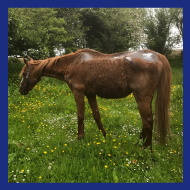
Charity says rehabilitation efforts ‘would not be possible’ without work with vets
The “critical importance” of the working relationship between the RSPCA and equine vets has been highlighted at the British Equine Veterinary Association (BEVA) Congress.
Speaking at the International Convention Centre in Birmingham, RSPCA chief veterinary officer Dr Caroline Allen, said: “It is fantastic to be representing the RSPCA at the hugely important British Equine Veterinary Association Congress.
“Sadly, the mistreatment of equines is a very big part of the RSPCA's frontline work – but our efforts to rescue, rehabilitate and rehome horses would not be possible without our work with vets.
“The RSPCA’s working relationship with equine veterinary professionals is of critical importance, and this congress is a great opportunity to discuss how we can do even more to help one another and support even more equines across England and Wales.”
Her comments followed the ‘miraculous’ transformation of one of the countless horses rescued by the charity every year.
Jack, a veteran 15-hand chestnut gelding, is finally settling into his new home after having made a complete transformation since coming into the RSPCA's care.
In May 2018, RSPCA officers found Jack ‘with serious welfare concerns’ at an abandoned stable in Furnace, near Llanelli. Many months of care and rehabilitation followed, with a veterinary assessment confirming Jack had indeed been suffering when first abandoned.
RSPCA inspectorate national equine co-ordinator Christine McNeil, who also spoke at BEVA Congress, said: “Jack’s journey highlights the sort of horrendous conditions many equines are subjected to each and every year.
“Thankfully, thanks to our relationship with equine vets, we are able to help so many of these beautiful animals each and every year – and we look forward to continuing to work closely with the equine veterinary profession.”
Image (C) RSPCA.



 The Animal and Plant Health Agency (APHA) has updated its online reporting service for dead wild birds.
The Animal and Plant Health Agency (APHA) has updated its online reporting service for dead wild birds.